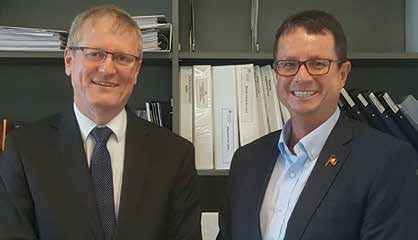I am very excited about this Winter issue of O&G Magazine. The editorial team have done a fantastic job, as always, of drawing together a highly skilled group of contributors to look at how we respond to emergencies and urgent matters. Our specialty is especially prone to high-stake, emergency situations; it is part of the excitement of the job at times. Protocols change and it is important that we all hone our skills and stay in-date with emergency clinical practice. I am sure you will enjoy this issue just as much as I do. My personal thanks to all of our generous authors for another excellent issue.
Mesh matters
I attended a urogynaecology meeting in the UK last year, and the aftermath of the Scottish Government’s 2014 decision to request suspension of the use of transvaginal mesh in the NHS, pending safety investigations. At the time, members of the Scottish Mesh Survivors’ campaign told the Government committee of the ‘life-changing side effects’ they had suffered following mesh surgery. The following year, the Scottish Health Secretary apologised to women who were left in ‘severe pain’.
Fellows in New Zealand will be familiar with their own Government Health Select Committee Inquiry into mesh. The recommendations include a nationwide mesh register, and standardised reporting of adverse outcomes. Importantly, the Ministry of Health clearly stated that ‘the professional colleges are the most appropriate organisations to take the lead on professional practice matters such as appropriate use of surgical mesh and ensuring patients are informed of the benefits and risks of any treatment.’ This has put our College in the key position to guide practice in the area of mesh use in New Zealand, and is a credit to the hard work of New Zealand Fellows.
The Senate Committee is well underway in Australia, and recent media coverage in newspapers such as the Sydney Morning Herald has not exactly been reassuring for our patients:
Pelvic devices developed in Australia from the 1980s and 1990s are at the centre of a global medical scandal that includes regulatory failure, and allegations of research fraud and experimental surgery on women in multiple countries.
The final report of the Scottish Independent Review was released in March, after an exhaustive investigation process, and among its conclusions were:
Fundamental to the treatment of patients with SUI and POP is patient-centred care which should include patient choice and shared decision making supported by robust clinical governance. To support shared decision making, management of patients must take place in the context of a multidisciplinary team, supported by a quality assurance framework.
The [Review] does not consider that current research studies on safety and effectiveness provide sufficient evidence on long-term impact of mesh surgery.
If your patient shows symptoms of preterm labour or if she has high-risk factors, you need to determine if her risk of delivery is real or very low. Quantitative fetal fibronectin (fFN) testing can precisely measure the fFN concentration to help you further understand the risk of preterm birth.1
The [Review] expressed serious concern that some women who had adverse events felt they were not believed, adding to their distress and increasing the time before any remedial intervention could take place.
When it came to recommendations about mid-urethral tapes and transvaginal mesh, the issues were dealt with separately. Tapes for stress urinary incontinence were addressed first, with cautious support:
In the case of surgical treatment for SUI, a review of the different sources of evidence has led us to recommend that women must be offered all appropriate treatments (mesh and non-mesh) as well as the information to make informed choices.
However, transvaginal mesh did not fare so well:
In the surgical treatment of POP, current evidence does not indicate any additional benefit from the use of transvaginal implants (polypropylene mesh or biological graft) over native tissue repair. Transvaginal mesh procedures must not be offered routinely.
The College is developing a submission to the Senate Inquiry, and the Terms of Reference for this inquiry should be of interest to many Fellows in Australia, including:
- The number of women in Australia who have experienced adverse side effects
- Information provided to women prior to surgery about possible complications and side effects
- Any financial or other incentives provided to medical practitioners to use or promote transvaginal mesh implants
By the time you read this column, the College submission to the Senate Inquiry will have been delivered. Indeed, if any Fellow – or other person – would like to make a submission to the Inquiry, you should go to the Senate website and follow the links. As this is an issue of great importance to many Fellows, I will make sure you are aware of all developments as they happen, through Collegiate and on the College website.
Private practice
The situations are different in Australia and New Zealand, but a very large proportion of clinical activity in our speciality in Australia occurs in the private sector. Australia has a long history of balance between private and public medicine, with many Fellows and Diplomates, as I do, working across both sectors. Almost one third of births in Australia are in the private system, and more than half of all gynaecological procedures and operations are in private hospitals and day procedure centres. For this reason, the health of the private sector in Australia is of fundamental importance to women.
I have a private obstetrics and gynaecology practice, and understand well the complexities of running the practice and providing good and valued clinical care.
In addition to providing care, I have to run the business and try to turn a profit – something that isn’t quite so easy with Presidential responsibilities to attend to. There seem to be potential threats on the horizon that make me feel uneasy: changes to the uptake of private health insurance; possible changes to medical indemnity schemes; and, complying with revalidation requirements. Running a private practice is a major challenge, and I am sure that many of my colleagues feel the same way.
I am determined to take a number of steps to address the concerns of many College Fellows and Diplomates about the viability of their private practices. Fellows have been surveyed about how the College could potentially assist those in private practice, and focus groups are underway. I want to reassure all Fellows that the College supports those in private practice, and I am finding ways of providing practical assistance.
Women at disadvantage
The standards of care we can provide to our patients in Australia and New Zealand are, in many respects, the envy of the world. However, there are many women who face obstacles in accessing the care we can provide. Health outcomes for Aboriginal and Torres Strait Islander women in Australia are a long way from those of non-Indigenous women, and similar problems face Māori women in New Zealand. Migrant and refugee women are at enormous social disadvantage, and this risks their own, and their entire families’, health. Close to us, women in Pacific countries and regions such as Timor Leste have little or no access to the standards of healthcare we take for granted.
I am working to engage the College on all of these fronts. I recently spent the morning with the Minister for Indigenous Health here in Canberra, with my fellow college Presidents, and we are determined to do everything possible to close the gap in health outcomes. I continue to Chair the Migrant and Refugee Women’s Health Partnership, and this broad group – Government, community groups, and the colleges and AMA – are working towards a community framework to enhance the healthcare of this large group of women. I have also commissioned a strategic review of women’s health across the Pacific, to help determine how best the College can support women in our neighbouring Pacific countries.
“I am pleased to announce that the College will be holding a Women’s Health Summit in the first part of 2018.”
Engagement
The only way the College can continue to achieve its mission – providing excellence in women’s health – is by engaging broadly. Engaging with Fellows, Diplomates, trainees and other members. Engaging with Governments at all levels and across both Australia and New Zealand. Engaging with the community in general, and with women in particular. I believe we are perfectly placed to drive policy development for the betterment of women’s health. For this reason, I am pleased to announce that the College will be holding a Women’s Health Summit in the first part of 2018. This summit will draw interested parties from across Australia and beyond, with a view to developing a set of policy imperatives that must be addressed by Governments. The College will set the agenda for women’s health for the next decade and beyond, ahead of the next Australian Federal election.
As always, I need to thank all those who contribute to the life and activity of the College; the wonderful pro bono workforce who do so much for us, and the College staff for their dedication and expertise. I hope all of you rug up over winter, and I look forward to reporting back to you in spring.

Prof Steve Robson meeting with Dr John Brayley, Chief Medical Officer for the Department of Immigration.






Leave a Reply